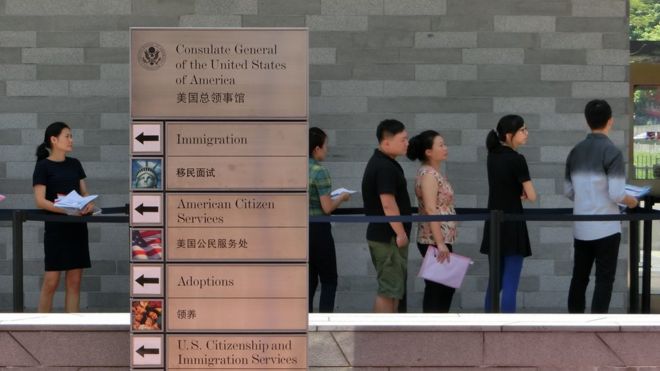BY C. DANIELLE BIZIER
More U.S. citizens have been evacuated from a U.S. consulate in Guangzhou, China, after suffering what appears to be the same strange, sound-related illness that afflicted consulate workers in Cuba. The New York Times reported that consulate worker Mark Lenzi and his wife heard strange noises over the course of several months before falling ill with what they described as neurological symptoms.
On Wednesday night they were flown to the U.S. with their children, including a three-year-old son who was also affected.
Speaking to The Washington Post that same day, Lenzi described the sound as being like “marbles bouncing and hitting a floor then rolling on an incline with a static sound.”
Speaking to The Washington Post that same day, Lenzi described the sound as being like “marbles bouncing and hitting a floor then rolling on an incline with a static sound.”
The Lenzis reached out to their neighbors to see if the sound was coming from their home but the neighbor denied it.
Several months after the sounds began, the Lenzis began to develop migraine like headaches and suffer from sleep deprivation.
Medical professionals at the consulate prescribed sleeping pills to help with the insomnia.
In May, Lenzi found out that the same neighbor had been evacuated after exhibiting the same symptoms.
In May, Lenzi found out that the same neighbor had been evacuated after exhibiting the same symptoms.
He was checked and diagnosed with a “mild traumatic brain injury,” the State Department said in a statement.
That statement also said the government did not know of any other cases — which according to Lenzi, was a lie.
He told The Washington Post that he he’d filed several reports with both the consulate and the State Department.
Lenzi also contends that his security clearance was frozen after he attempted to bring attention to the issue, effectively barring him from work at the consulate, and that he is now calling for the resignation of the U.S. ambassador to China, who is based in Beijing.
The New York Times is also reporting that a State Department medical team flew to Guangzhou and is performing tests on other employees and their family members — some 170 workers in total at the site, plus their family members.
If this case sound eerily familiar, it should.
Lenzi also contends that his security clearance was frozen after he attempted to bring attention to the issue, effectively barring him from work at the consulate, and that he is now calling for the resignation of the U.S. ambassador to China, who is based in Beijing.
The New York Times is also reporting that a State Department medical team flew to Guangzhou and is performing tests on other employees and their family members — some 170 workers in total at the site, plus their family members.
If this case sound eerily familiar, it should.
In 2016, 24 people — all embassy workers and their families there – suffered the same symptoms at the U.S. embassy in Havana, Cuba.
Those symptoms included dizziness, headaches, tinnitus, fatigue, cognitive issues, visual problems, ear complaints and hearing loss, and difficulty sleeping, the State Department said at the time.
Tests concluded that they had suffered injuries consistent with concussion or minor brain injury.
In the wake of the initial illnesses, speculation on the cause included the possibility of targeted sonic attacks that might cause such disruption.
In the wake of the initial illnesses, speculation on the cause included the possibility of targeted sonic attacks that might cause such disruption.
The U.S., blaming Havana, expelled Cuban dignitaries following the incident.
Additional theories include bacterial poisoning, neurotoxins, and surveillance devices that emit disabling sounds.
On Tuesday, Secretary of State Mike Pompeo announced the launch of The Health Incidents Response Task Force, which had been created to respond to the unexplained ailments, including testing workers and families at the Guangzhou consulate.
On Tuesday, Secretary of State Mike Pompeo announced the launch of The Health Incidents Response Task Force, which had been created to respond to the unexplained ailments, including testing workers and families at the Guangzhou consulate.
The task force’s role includes “identification and treatment of affected personnel and family members, investigation and risk mitigation, messaging, and diplomatic outreach.”
On May 24, Chinese foreign ministry spokesman Lu Kang said in a regular press briefing that China had investigated the initial May 16 case, but had not found a reason for the illness.
On May 24, Chinese foreign ministry spokesman Lu Kang said in a regular press briefing that China had investigated the initial May 16 case, but had not found a reason for the illness.
The Russians have a history of using toxins against the foreign diplomatic corps, but the Chinese have stayed primarily in the lanes of active and aggressive surveillance.
Some attachés tell stories of playing along with the status quo by asking aloud in their homes for help finding missing items such as car keys and glasses.
They would leave the home after the request for a few moments and return to find the items placed conspicuously on their kitchen table.
The Chinese have never been shy about making sure American diplomats knew they were under constant monitoring — though before now, the most aggressive tales involved State Department officials returning home to find someone had defected in their toilet and left it without flushing.
The potential sonic attacks we are now beginning to see are more reminiscent of Cold War era Soviet tactics — but perhaps par for the course of the ever-growing tensions.
The potential sonic attacks we are now beginning to see are more reminiscent of Cold War era Soviet tactics — but perhaps par for the course of the ever-growing tensions.

 The affected staff member reportedly worked at the US consulate in Guangzhou
The affected staff member reportedly worked at the US consulate in Guangzhou